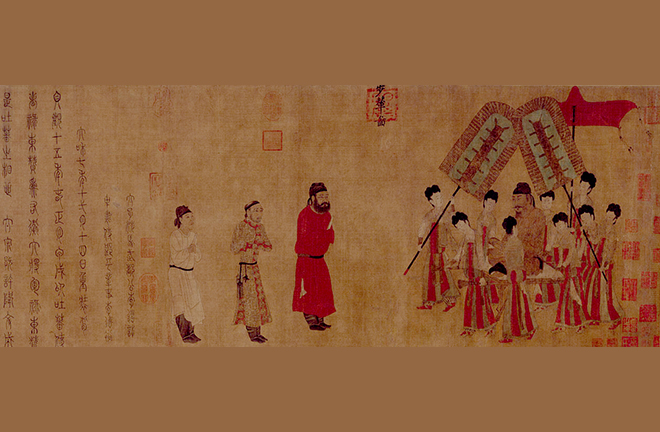Promoting research on ancient Chinese security strategy

“Emperor Taizong Receiving the Tibetan Envoy,” a painting by Yan Liben, shows the friendly encounter between the Tang dynasty and Tibet, which reflects the peacebuilding dimension of ancient Chinese security strategy. Photo: The Palace Museum
Ancient Chinese security strategy can be broadly understood as the policies and strategies adopted by ancient Chinese dynasties to safeguard and strengthen their security. This article aims to explore the significance, approaches, and challenges of researching ancient Chinese security strategy.
Academic significance
Strengthening research on ancient Chinese security strategy contributes to improving the disciplinary system of national security studies. Ancient Chinese security strategy lays the foundation for China’s national security studies and provides solid support for its independent development. Research on ancient Chinese security strategy can supplement international relations theory with Chinese concepts, experience, and perspectives. International relations theory is currently characterized by Eurocentrism, undermining its objectivity and scientific credibility. Non-Western wisdom should be vigorously integrated into international relations theory so that it can continue to advance.
Practical significance
Contemporary China can benefit from the intellectual resources, strategic wisdom, and historical lessons offered by research on ancient Chinese security strategy. Firstly, while ancient and modern China differ in many respects, there are certain commonalities and continuity between them. Secondly, despite the changes in the international security environment, some of the security issues faced by ancient China persist today, such as “great power confrontation,” “alliance and divergence,” “strategic overstretch and damage control,” and “aggressive strategy and retrenchment strategy.” Therefore, ancient Chinese security strategy is full of vitality and constitutes a valuable source of insight into the way contemporary Chinese security strategy can be improved.
Protecting and enhancing China’s academic discourse power at the global level requires stepping up research on ancient Chinese security strategy. As China moves closer to the center of the international stage, Chinese history has become an important frame of reference for other countries to observe and understand contemporary China.
Ancient Chinese security strategy has garnered significant attention from the international academic community. However, Western academics, in their inquiries into ancient Chinese security strategy, tend to consciously or unconsciously observe, interpret, and judge China through the lens of Western historical experiences and knowledge systems. This may lead to inaccurate and biased conclusions, which could be exploited by individuals with ulterior motives as a theoretical basis for attacking and discrediting China. For this reason, the Chinese academic community cannot afford to ignore the study of ancient Chinese security strategy.
Multiple approaches
To realize its academic and practical potential, research on ancient Chinese security strategy can adopt the following approaches. First, research on strategic decision-making and implementation in specific circumstances should be prioritized. Chinese and overseas scholars have made considerable progress in areas such as the interstate political thought of pre-Qin philosophers, ancient Chinese strategic culture, and the concept of “Tianxia” (“all under heaven”). However, there has been an excessive focus on the ideas, concepts, and institutions described in the texts, with insufficient attention paid to the actual policy practices.
Second, it is essential to comprehensively apply modern social science research methods. This can involve employing interdisciplinary research approaches, integrating knowledge and methods from disciplines such as political science, economics, anthropology, psychology, and others.
Third, fine-grained empirical research should be emphasized. Some previous studies on ancient Chinese security strategy have been overly macroscopic, seeking to identify a few general characteristics or universally applicable principles in Chinese history. While such studies could be necessary in certain periods, it is important to uncover truths and meanings based on rigorous argumentation and solid evidence, and explore the motives and mechanisms at a deeper level.
Fourth, it is preferable to analyze the security strategies employed in historical periods that bear resemblance to the present day in terms of China’s own realities and the global situation, thereby gaining more targeted and effective insights.
Fifth, it is necessary to compare China’s security strategy with those of other major powers. The modern era has witnessed the rise and fall of various major powers, each with its own set of security strategies with advantages and disadvantages. Meaningful historical lessons can be drawn by comparing ancient Chinese security strategy with the security strategies of these countries. Such comparison can also serve to paint a more genuine and credible picture of ancient Chinese security strategy.
Several challenges need to be addressed if research on ancient Chinese security strategy aims for high-quality output and major breakthroughs. For example, research materials are insufficient, and their authenticity and credibility could be problematic. It is therefore difficult to gain insights that are effectively relevant to contemporary China. As the meaning of the core concepts associated with ancient Chinese security strategy has evolved over time, tremendous efforts are needed to clarify these concepts. Research on ancient Chinese security strategy should proceed steadily and maintain high standards to realize its academic and practical potential, ultimately contributing to China’s security and development.
Du Zheyuan is an associate professor in the School of Political Science and Public Administration at China University of Political Science and Law.
Edited by WANG YOURAN
